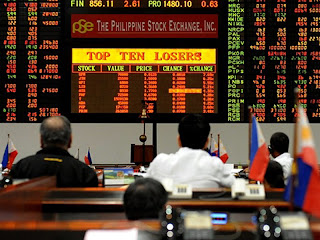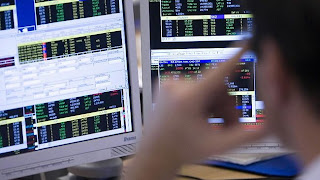WHY STOCK MARKET IS CALLED A MARKET?...
Posted by jov3n- trader202 on Friday, April 20, 2012 Under: Investing
 When people talk about a “market”, they usually think first of a place where people purchase goods. For example, the “wet” market is a place where people buy “wet” goods – fresh produce such as meat, vegetables and the like. A supermarket combines the wet market with the dry market – creating a convenient solution to purchasing goods in one place.
When people talk about a “market”, they usually think first of a place where people purchase goods. For example, the “wet” market is a place where people buy “wet” goods – fresh produce such as meat, vegetables and the like. A supermarket combines the wet market with the dry market – creating a convenient solution to purchasing goods in one place.In actuality, though, markets are everywhere. Every time we get something in exchange for another thing, we trade. A market is basically a system that facilitates trades or exchanges. By trading in a market, people who have something that they have exchange that thing for something that they want from other people.

From the word itself, the stock exchange or the stock market is basically a market where stocks are sold. That is basically it – the stock market allows people to buy stocks, and then trade them with other stocks or convert them into cash.
Once a person acquires ownership of a stock, he or she basically has a piece of property, much like a car or a cellphone. But for example, what would that certain person do if the following things occurred?

1. That person wants to acquire more stocks from other companies – more stocks from different companies mean that the person has more corporations owned. The feeling of being a “business tycoon” owning several companies (even if it’s a percentage) is still something to be proud of.
2. That person sees that the company is not doing well because of many reasons – low dividends, poorly performing managers, or a poor business plan for the year. That person would also like to try owning other stocks to see whether they pay better.
3. In some cases, the investments need to be used for other purposes as cash. For example, buying a new house, a new car or a new gadget requires a huge amount of money, and it might be the case that the stock houses a portion of savings of that person.
Also, there are also cases where persons would like to own a share of a company (for example, a certain company is known to be a good investment). Then again, companies don’t really release stocks that easily – there are many considerations in asking for money in exchange for ownership.
The stock market serves as the system of trading (as with all markets) for stocks. The stock market basically aims to:
Bring people who want to sell their existing stocks in a system that allows them to trade their ownership of stock for cash or for other stocks, instead of advertising their stocks in other media (such as classified ads).
 Bring people who want to buy a certain company to a place where they can safely and efficiently buy what stocks they want, for a certain price of course.
Bring people who want to buy a certain company to a place where they can safely and efficiently buy what stocks they want, for a certain price of course.The stock market makes the trading of stocks more efficient and safer. For example, rather than go out of the street announcing that you own 100 shares of Jollibee (and risk getting robbed by criminals), the stock market brings that owner of Jollibee shares to a place where he can sell that amount of stock to another person who thinks that Jollibee is a good investment in the next 5 years. In a way, it serves as a supermarket for a certain type of good – stocks.
There are, of course, differences between your regular supermarket and the stock market:
Because we are dealing with intangible goods here, there is strong regulation from the government in order to control and guard the integrity of the market. Ownership, which cannot be touched, is being sold in the market for huge amounts of money. It would be unethical, if not unjust if the government would allow tricksters and scammers have their way in the market through counterfeiting and deception. Unlike the supermarket where you are free to choose what you want to buy, the stock market has several controls to ensure that trading goes on fairly and smoothly.
 In the Philippines, we have the Philippine Stock Exchange (PSE), a private corporation whose role is to provide the Philippines with an efficient system of exchange for stocks. The Philippine Stock Exchange is the result of the unification of the Manila Stock Exchange (MSE) and the Makati Stock Exchange (MKSE) in 1993 to provide a single unified market system. Right now, the market exists in two places: In Ayala Center, Makati and in Tektite in Ortigas Center, Pasig.
In the Philippines, we have the Philippine Stock Exchange (PSE), a private corporation whose role is to provide the Philippines with an efficient system of exchange for stocks. The Philippine Stock Exchange is the result of the unification of the Manila Stock Exchange (MSE) and the Makati Stock Exchange (MKSE) in 1993 to provide a single unified market system. Right now, the market exists in two places: In Ayala Center, Makati and in Tektite in Ortigas Center, Pasig. source: PhilStock
In : Investing
Tags: stock market what is stock market how stock market works investing investment money market money flow stick investing philipinne stock exchange pse philippine business market
blog comments powered by Disqus






